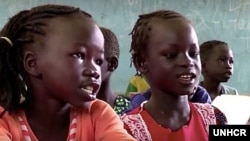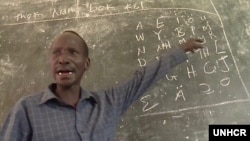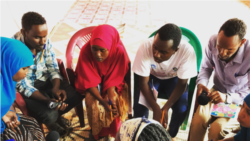Teacher Koat Reath is a refugee from South Sudan. His students are, too. They smile as they sing along with him in their classroom.
Koat and his students are living at the Jewi refugee camp in Gambella, Ethiopia. They have fled fighting in their homeland. Koat believes that education is the solution to a better future in South Sudan.
Koat says he wants to make sure the young -- and the old -- are ready to take part in rebuilding the country.
"I'm teaching these children to be the doctor, and the president and the pilot, so this is my role to volunteer myself to teach these children to build a good future in South Sudan, to do a good thing."
He teaches his students how to read and write in their native language, Nuer. And he makes a point of adding a few words in English.
Koat Reath has been teaching for almost 10 years. He says children learn better when their classes are fun. Keeping their attention can be difficult in the camp. At any time, more than 100 students fit tightly into one room.
This past summer Koat provided extra classes to his students under an initiative of Plan International and other partners of the United Nations refugee agency. The idea is to help children catch up on schooling they missed because of fighting in South Sudan. He also teaches adults at the camp.
South Sudan's conflict has had a major effect on children. Jewi camp is home to fifty-four thousand refugees. As many as two-thirds of them are children. They lost their homes and some saw family members killed. The years of violence have also prevented the youngsters from having an education. Some never even had a chance to start school, and many who did have dropped out altogether.
Koat Reath shares much more than a love of learning with his young students. Like them, he is a victim of a war. He and his family fled to Ethiopia in 2015 after their home in Jonglei state was burned to the ground.
Nyamani Pur is a refugee student. She praises Koat’s work in the classroom.
She says, “I like how he teaches, and he is very funny. I like that.”
Koat and his fellow teachers are doing what they can to help their students. At this time, only two-thirds of South Sudanese children in Ethiopia can attend primary school.
Most of those attending primary school — about 86 percent — do not and cannot continue on to secondary school.
There are not enough classrooms, trained teachers or teaching materials for the South Sudanese refugees.
Koat is 41 years old and a father to five children. He admits to sometimes feeling tired, but keeps on going.
"I am tired, but I cannot say that I am tired because I am forwarding (preparing) the people to be like me or to be like other people around the world.”
The South Sudanese refugees learn in their native language and in English, while their teachers work to adapt to the Ethiopian education curriculum.
Many teachers say their monthly pay of $27 is not enough. So they look for other kinds of work.
But not Koat Reath. He has a purpose, and loves what he is doing.
"I love this teaching because I want to forward (prepare) the young generation to be the good children in the future."
I’m Anne Ball.
Katie Nguyen wrote this story for Reuters News Agency. Anne Ball wrote it for VOA Learning English. The audio, taken from video, was provided by the UNHCR. George Grow was the editor.
What do you think of this story? Write to us in the Comments Section below.
_________________________________________________________________
Words in This Story
role – n. a part that someone or something has in a particular activity or situation
fit – v. to go into or through a particular space
initiative – n. a plan or program that is intended to solve a problem
catch up – n. to try to reach the same position, score, etc., as a competitor after you have fallen behind
drop out – n. a person who stops going to a school, college, etc., before finishing : a person who drops out of school
primary school – n. a school for young children
curriculum – n. the courses that are taught by a school or college









